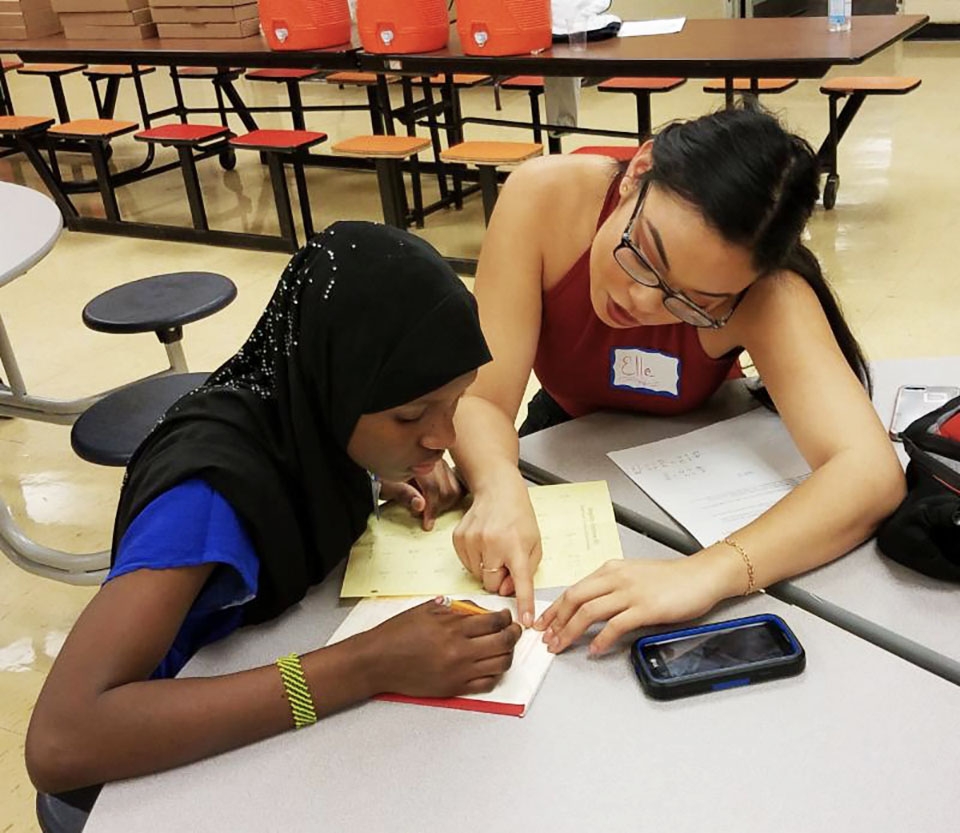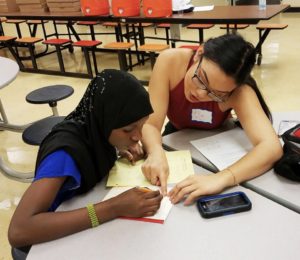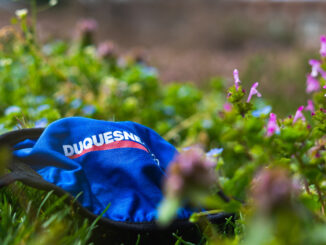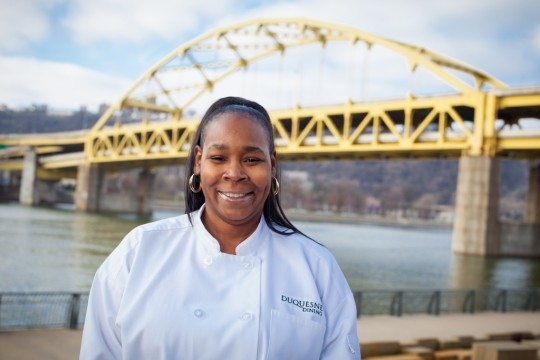
A volunteer assists a refugee child with her schoolwork during a JFCS program.

A volunteer assists a refugee child with her schoolwork during a JFCS program.
Gabriella DiPietro | Asst. News Editor
03/22/18
Many college-level students are expected to complete assignments and readings outside of class, but Duquesne’s Politics of Immigration course has taken out-of-class work to the next level by branching out into the community.
In this class, community engagement activities are integrated into the curriculum, where students volunteer at an after-school program organized by two community partners, including Jewish Family and Community Services (JFCS) and Alliance for Refugee Youth Support and Education (ARYSE).
The program, located at the Pittsburgh Gifted Center in Crafton Heights, works to assist Pittsburgh’s refugee youth in grades K-12 with homework completion, improving their English skills and emotional well-being, all while having fun doing so.
The course challenges students to complete readings about migration policies in the U.S., keep reflection and field journals, participate in class discussions and attend at least four sessions of the after-school program.
Jennie Schulze, a professor in the political science department who teaches the Politics of Immigration course, explained the expectations that students enrolled in course face.
“The class is designed to be a comparative course that exposes students to the challenges of migration in both the European and U.S. contexts from perspectives of migrants, policymakers and community organizers,” Schulze said. “I expect that students can discuss those challenges in comparative context, with case study examples, and can use theory to explain why various groups migrate and what factors facilitate their integration.”
Politics of Immigration is an elective course offered every one to one-and-a-half years within the political science and international relations concentrations, though students from other majors and schools are welcome to take the course as well.
Joy Padolf, a sophomore majoring in political science and international relations, is enrolled in the class and values how she has been able to help the surrounding community.
“Often college classes feel self-absorbed, in a way of ‘what can I get out of this class,’ but in Politics of Immigration, it is more focused on what we can do as a class to help,” Padolf said.
Schulze also noted the importance of her class and how this course’s content can impact a student’s ability going forward.
“It is important that upper level political science majors recognize the importance of learning from and triangulating between scholarship, community partners and the populations our policies are intended to serve,” Schulze said. “We need to learn from all three if our policies are going to be both efficient and effective. It is also difficult to develop civic values and civic empathy toward those populations, particularly immigrants and refugees, without coming into contact with them … For this reason, community engagement is an important aspect of the course.”
Andrew Van Treeck, the refugee and immigrant volunteer coordinator at JFCS, described how the students’ volunteerism not only impacts refugee children, but the students as well.
“This class is important because it is providing American mentorship and engagement to the refugee families, which they often lack due to their low level of English proficiency,” Van Treeck said. “It is also educating Dr. Schulze’s students by providing real-life examples of the information they are learning in her class, and it is providing career development opportunities through internships for some of her students.”
In addition to volunteering at the after-school program, students are working together to plan and fundraise for a Family Fun Event that will take place at the end of the semester in order to commemorate the work and success demonstrated by both the Duquesne and refugee students.
Another student in the class, Sydney McCabe, a junior international relations and women’s gender studies major, described the event.
“Although we have guidance from our professor and community sponsors, whether or not this event happens and is successful really depends on the students. Though it is a big responsibility, it will also be unbelievably rewarding when we pull it off,” McCabe said. “This is not a theoretical project. You actually get to see the results of your hard work in the real world.”
According to Schulze, the course links to the Duquesne’s mission and Spiritan values of walking alongside the most marginalized, and it encourages students to become more active and engaged citizens in both the community and the world.
To learn more about the course and ways to get involved in the after-school program or the Family Fun Event, email Schulze at schulzej@duq.edu.




